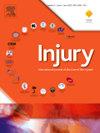Perspectives of a newly developed UK major trauma and plastics psychology service: A qualitative service evaluation
IF 2
3区 医学
Q3 CRITICAL CARE MEDICINE
Injury-International Journal of the Care of the Injured
Pub Date : 2025-07-19
DOI:10.1016/j.injury.2025.112619
引用次数: 0
Abstract
Introduction
Despite evidence of frequent adverse psychological reactions including PTSD in major trauma survivors, psychological support represents a frequent gap in UK major trauma care pathways. North Bristol Trust Major Trauma and Plastics Psychology Service has been newly developed in response at an NHS Major Trauma Centre (MTC). The service aims to address patients’ psychological needs early on and throughout recovery from major trauma, alongside physical and functional recovery. Thus, a qualitative service evaluation was conducted. It aimed to explore major trauma clinicians’ perspectives and experiences of the psychology service and to identify areas of strength and opportunity for development.
Method
Semi-structured interviews were conducted with a purposive sample of seven major trauma clinicians working at the MTC who make referrals to, and interact with, the psychology service. Data were thematically analysed using a codebook approach.
Results
Thematic analysis of qualitative data revealed five themes: (1) Necessity of specialist psychology for major trauma patients; (2) Psychological involvement facilitates patients’ recovery; (3) Psychologists have an important role in supporting clinicians; (4) Requirement for service expansion; (5) Importance of psychologists’ integration within a multidisciplinary team. Overall, the importance of the psychology service in facilitating patients’ holistic recovery was emphasised, as well as its role in emotionally and professionally supporting major trauma clinicians. Service expansion was suggested to better meet patients’ needs by permitting increased provision of training and formalised support sessions for clinicians, greater involvement of psychologists in rehabilitation, and psychological support for patients’ families.
Conclusions
Findings highlighted a perceived positive impact of integrated, specialist psychological support on the recovery of major trauma patients and the psychological wellbeing of major trauma clinicians. A need for future service expansion to overcome current capacity pressures and permit suggested developments was also emphasised. Replication of the psychology service in additional NHS MTCs to reach patients in other regions offers a potential solution to current inequities in post-major trauma psychological care in the UK.
新发展的英国重大创伤和整形心理服务的观点:定性服务评价。
引言:尽管有证据表明,在重大创伤幸存者中经常出现包括创伤后应激障碍在内的不良心理反应,但心理支持在英国的重大创伤护理途径中经常出现缺口。北布里斯托尔信托重大创伤和塑料心理服务已在NHS重大创伤中心(MTC)响应新开发。该服务旨在解决患者在重大创伤早期和整个康复过程中的心理需求,以及身体和功能恢复。因此,进行了定性的服务评价。它旨在探讨主要创伤临床医生的观点和心理服务的经验,并确定优势和发展机会的领域。方法:采用半结构化访谈的方法,对七名在MTC工作的主要创伤临床医生进行了有目的的访谈,他们向心理服务部门转诊并与之互动。使用代码本方法对数据进行主题分析。结果:定性数据的专题分析揭示了五大主题:(1)专科心理治疗对重大创伤患者的必要性;(2)心理介入有利于患者康复;(3)心理学家在支持临床医生方面具有重要作用;(4)业务拓展需求;(5)心理学家融入多学科团队的重要性。总的来说,心理服务在促进患者全面康复方面的重要性被强调,以及它在情感和专业上支持主要创伤临床医生的作用。建议通过增加对临床医生的培训和正式支持会议,心理学家更多地参与康复工作,并为患者家属提供心理支持,从而扩大服务,以更好地满足患者的需求。结论:研究结果强调了综合专业心理支持对重大创伤患者康复和重大创伤临床医生心理健康的积极影响。会议还强调,未来需要扩大服务,以克服目前的能力压力,并允许建议的发展。在其他NHS MTCs中复制心理服务,以达到其他地区的患者,为英国目前在重大创伤后心理护理方面的不平等提供了潜在的解决方案。
本文章由计算机程序翻译,如有差异,请以英文原文为准。
求助全文
约1分钟内获得全文
求助全文
来源期刊
CiteScore
4.00
自引率
8.00%
发文量
699
审稿时长
96 days
期刊介绍:
Injury was founded in 1969 and is an international journal dealing with all aspects of trauma care and accident surgery. Our primary aim is to facilitate the exchange of ideas, techniques and information among all members of the trauma team.

 求助内容:
求助内容: 应助结果提醒方式:
应助结果提醒方式:


